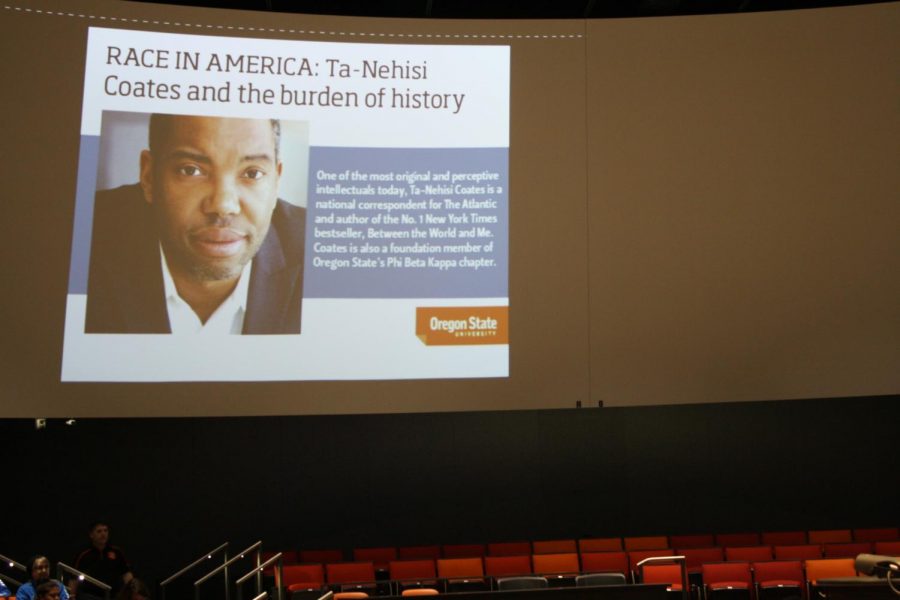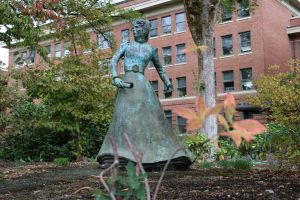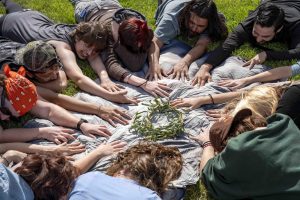“Maybe, Just Maybe”: Ta-Nehisi Coates on ‘Race in America’
February 7, 2017
In a world where people begin to feel their voice lost in the rabble, the importance of standing up for beliefs and opinions has only grown stronger. World-renowned and New York Times bestseller Ta-Nehisi Coates is one who chooses to declare his voice above the noise and stand for his beliefs. Oregon State University was honored to host Coates for a speaking event this past week on behalf of Phi Beta Kappa, a prestigious nationwide Honors Society. Coates was inducted as an honorary member of the OSU Phi Beta Kappa Chapter, which was established last school year. The Honor Society’s motto, “Love of learning is the guide of life,” inspired the campus’s chapter to nominate and induct the writer as a member of its new establishment.
The Dean of the Liberal Arts College, Larry Rodgers, introduced Coates at the beginning of the event, specifically noting this simple yet powerful statement: “Facts matter…what is provable, testable, claimed by history is different than what is asserted….” The Dean’s short introduction was followed by Coates taking the stage and beginning his speech, which was followed by a section of question and answer based on previously submitted questions given by staff, students and other audience members.
Facts matter. Yet Coates countered this with another thought: While facts are important, the power of lies has an unseen potency. “Just because people of power have a politically correct way of saying things, we don’t need to use it. Call it what it is,” Coates said. He went on to discuss the parallels between slavery in American history and the repeated themes beginning to come to light with the recent “Muslim ban”. He presented the similarity between black and Muslim people understanding the idea of being a stranger, of feeling out of place and the comradery these feelings can foster despite the struggles.
Determining the point of race, he referenced several themes from his New York Times bestseller, “Between the World and Me”, a book with personal narrative aspects and introspective learning experiences. “Race is manufactured,” Coates said. He followed this statement with an excerpt from his book:
“Racism–the need to ascribe bone-deep features to people and then humiliate, reduce, and destroy them–inevitably follows from this inalterable condition. In this way, racism is rendered as the innocent daughter of Mother Nature, and one is left to deplore the Middle Passage or the Trial of Tears the way one deplores an earthquake, a tornado, or any other phenomenon that can be cast beyond the handiwork of men. But race is the child of racism, not the father. And the process of naming “the people” has never been a matter of genealogy and physiognomy so much as one of hierarchy. Difference in hue and hair is old. But the belief in the preeminence of hue and hair, the notion that these factors can correctly organize a society and that they signify deeper attributes, which are indelible–this is the new idea at the heart of these new people who have been brought up hopelessly, tragically, deceitfully, to believe that they are white.” (Between the World and Me, p. 7)
In his book, Coates describes the development of race as a product of racism, as the idea that concepts of racism existed before any definition of race, black or white existed. In his speech, he utilized the previous passage to discuss the impact these themes have in today’s society. “Racism came first.” He vehemently described the creation of the term “race” as the result of several significant issues. He first noted that the development of “race” was backed by African-Americans and other minorities as a way to define the wrongs done against their peoples.
The second issue he referenced was the rape culture during slavery. White masters would take advantage of black slave women, thereby creating the mulatto population of bastard children. The development of the term “race” and defining black and white was supported by the white slave owners as an establishment of separation between their white children and their mulatto children. The need for “race” during slavery was more for the clarification of who was “able” to be enslaved and who could be considered free.
“There is no consistent definition…of race across history and geography….There is no test for determining what is black.” Coates noted the historical example of the Irish immigrating to the United States but initially not being considered “white,” and this fact paired with the continual separation of race based on characteristics and color for a certain group’s personal advancements. Throughout the 17th and 18th centuries, the “color line”–as W.E.B. Du Bois describes it and as Coates reiterates–the separation of “black” and “white” was done in order to allot privileges to specific people and strip rights from the other.
Coates asserts that the creation of the word race was to divert the responsibility of slavery from the white slave owners as well as justify the enslavement.
“[It was about] preserving access to bodies for a certain class of men and to maintain a labor force….Slavery is not a bump in the road. It is the road. There is no America without slavery. This is…a factual statement….The bodies of the four million black slaves were seen as a huge economic institution….The way you accumulated wealth was buying people….To maintain that [wealth], you had to manufacture ideas about race.”
However, he notes that these ideas of race translate into contemporary moments. He strongly claims the historical reasonings behind race reflect in the present, specifically with the most recent executive order. Coates offers comfort and support for those struggling to come to terms with the immigration ban, declaring a kinship between them and the historical conflicts black people in America have suffered–the idea of being strangers and of a different value than others.
He claimed he saw his own history as a black beginning to repeat. He offered consolation and hope in the face of uncertainty: “To the folks in the affected communities, with family members in the affected countries, it may not mean much, but I’m with you.” Followed by an incredible roar of applause, Coates ended with a challenge going forward to think about the responsibility we as adults in America have in the political field. “Your vote matters. A lot,” he said. “As an adult, you may have to make decisions you may not like at all.” He referenced the difficulty of coming to terms with the policies and actions of either political party and how this is a part of maturing and becoming part of America. He ended on the following note: “But sometimes as we mature and as we grapple with our political consciousness, there’s some facts we need to face too.”
Ending on a standing ovation from the live audience and thunderous applause from satellite locations as well, Coates began to interact with a member of the OSU staff and initiate the question and answer session. As a famous author, most of the questions pertained to writing or to pieces of his published works in order to gain more insight.
When asked what his method of coping with reality looked like, he responded with the fact that by coming and speaking in front of audiences such as the ones present and by continually writing, he is able to come to better terms with reality. “From an African American perspective, there’s nothing new here….African American people have been enslaved more than they’ve been free,” he noted. He explained he only comes to better terms with reality and accepts it as it is versus the concept of coping.
He continued this idea when asked about the lessons to be learned about redemption and the progressive era following the Reconstruction period. Coates declares his refusal to believe the lies of worthlessness or lesser worth determined by the explanation of race and color. He said, “Du Bois had come to peace with the things he [couldn’t] change….I’m just declaring my humanity. I’m not going to listen to the lies.” His choice to declare humanity and refuse the lies of worth developed by choices in history once again connected to his support for those struggling with the most recent immigration decision, and the idea that value is chosen by self, not another.
In Between the World and Me, Coates’ audience is his teenage son in an attempt to teach the lessons he wished he had known growing up. Yet when asked about who is general audience was, Coates responded with the answer that he himself was generally the audience for his writing. He described writing as something for himself, as a necessary outlet for his own thoughts. “When you don’t have an audience, you can’t think about an audience,” he explained. “You have to come to peace with people not reading what you write….”
Also within his book, Coates continuously mentions the divided approach to change either by violent or nonviolent strategies. Though in his writing he shows scorn for nonviolent approaches, he speaks on the opposite when asked if the movements should be nonviolent. “I think non-violence is all we have….One of the most depressing things is the members [of Black Panther] being manipulated to kill each other….America isn’t inherently evil. My problem is believing America is inherently good….If you see a problem in a [political] party, start building from the ground up. Run for public office.” His father was a member of their local chapter of Black Panther growing up, and his reference to the infighting he witnessed is another allusion to the idea that both nonviolent and violent approaches to social change have undesired outcomes. His challenge to become politically active again reiterates his dare to grapple with political responsibility.
The final question, “In a post-truth world, how can we be advocates of history and truth?”, allowed Coates to finish on a moment of inspiration and give one last challenge to the audiences. “All I can tell you is what I’ve done. It’s about writing efficiently…[about] communicating their obsession….Be honest….You can read [my writing] or not read it….I’m trying to [be honest] and efficient…and I think maybe, just maybe, that touches people….I think if you have any hope, you need to be honest….Write with confidence, write with force, and maybe, just maybe, it’ll touch people.” And maybe, just maybe, the students of Oregon State University have the power to begin the change Ta-Nehisi Coates spoke of: the power of honesty, facts, and truth in a turbulent world, backed by the strength of voice and writing.






